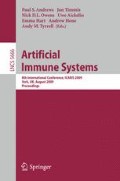Abstract
In this paper, a qualitative model learning (QML) system is proposed to qualitatively reconstruct the detoxification pathway of Methylglyoxal. First a converting algorithm is implemented to convert possible pathways to qualitative models. Then a general learning strategy is presented. To improve the scalability of the proposed QML system and make it adapt to future more complicated pathways, an immune-inspired approach, a modified clonal selection algorithm, is proposed. The performance of this immune-inspired approach is compared with those of exhaustive search and two backtracking algorithms. The experimental results indicate that this approach can significantly improve the search efficiency when dealing with some complicated pathways with large-scale search spaces.
Access this chapter
Tax calculation will be finalised at checkout
Purchases are for personal use only
Preview
Unable to display preview. Download preview PDF.
References
Forbus, K.D.: Qualitative reasoning. In: The Computer Science and Engineering Handbook, pp. 715–733 (1997)
Kuipers, B.: Qualitative Reasoning: Modeling and Simulation with Incomplete Knowledge. MIT Press, Cambridge (1994)
Shen, Q., Leitch, R.: Fuzzy qualitative simulation. IEEE Transactions on Systems, Man, and Cybernetics 23(4), 1038–1061 (1993)
Ljung, L.: System Identification – Theory For the User, 2nd edn. Prentice Hall, Upper Saddle River (1999)
Richards, B.L., Kraan, I., Kuipers, B.: Automatic abduction of qualitative models. In: National Conference on Artificial Intelligence, pp. 723–728 (1992)
Say, A.C.C., Kuru, S.: Qualitative system identification: deriving structure from behavior. Artificial Intelligence 83, 75–141 (1996)
Coghill, G.M., Srinivasan, A., King, R.D.: Qualitative system identification from imperfect data. Journal of Artificial Intelligence Research 32, 825–877 (2008)
Cooper, R.: Metabolism of methylglyoxal in microorganisms. Annual Review of Microbiology 38, 49–68 (1984)
Ferguson, G.P., Totemeyer, S., MacLean, M.J., Booth, I.R.: Methylglyoxal production in bacteria: suicide or survival? Archives of Microbiology 170(4), 209–218 (1998)
Michaelis, L., Menten, M.: Die kinetik der invertinwirkung. Biochem Z(49), 333–369 (1913)
de Moura, A., de Almeida, C., Grebogi, C.: Personal communication (February 2008)
de Almeida, C.: Modelling of methylglyoxal detoxification pathway in enteric bacteria. In: Abstract book of the 9th International Conference on Systems Biology, Gǒteborg, p. 170 (2008)
MacLean, M.J., Ness, L.S., Ferguson, G.P., Booth, I.R.: The role of glyoxalase i in the detoxification of methylglyoxal and in the activation of the kefb k + efflux system in escherichia coli. Molecular Microbiology 27(3), 563–571 (1998)
Bruce, A.M., Coghill, G.M.: Parallel fuzzy qualitative reasoning. In: Proceedings of the 19th International Workshop on Qualitative Reasoning, Graz, Austria, pp. 110–116 (2005)
de Castro, L.N., Von Zuben, F.J.: Learning and optimization using the clonal selection principle. IEEE Transactions on Evolutionary Computation, Special Issue on Artificial Immune Systems 6, 239–251 (2002)
Pang, W., Coghill, G.M.: Modified clonal selection algorithm for learning qualitative compartmental models of metabolic systems. In: Thierens, D. (ed.) Genetic and Evolutionary Computation Conference (GECCO 2007), pp. 2887–2894. ACM Press, New York (2007)
Pang, W., Coghill, G.M.: Advanced experiments for learning qualitative compartment models. In: The 21st International Workshop on Qualitative Reasoning, Aberystwyth, UK, June 2007, pp. 109–117 (2007)
Cutello, V., Narzisi, G., Nicosia, G., Pavone, M.: An immunological algorithm for global numerical optimization. In: Talbi, E.-G., Liardet, P., Collet, P., Lutton, E., Schoenauer, M. (eds.) EA 2005. LNCS, vol. 3871, pp. 284–295. Springer, Heidelberg (2005)
de Castro, L.N., Timmis, J.: An artificial immune network for multimodal function optimization. In: Proceedings of IEEE Congress on Evolutionary Computation (CEC 2002), pp. 674–699. IEEE Press, Los Alamitos (2002)
Author information
Authors and Affiliations
Editor information
Editors and Affiliations
Rights and permissions
Copyright information
© 2009 Springer-Verlag Berlin Heidelberg
About this paper
Cite this paper
Pang, W., Coghill, G.M. (2009). An Immune-Inspired Approach to Qualitative System Identification of the Detoxification Pathway of Methylglyoxal. In: Andrews, P.S., et al. Artificial Immune Systems. ICARIS 2009. Lecture Notes in Computer Science, vol 5666. Springer, Berlin, Heidelberg. https://doi.org/10.1007/978-3-642-03246-2_17
Download citation
DOI: https://doi.org/10.1007/978-3-642-03246-2_17
Publisher Name: Springer, Berlin, Heidelberg
Print ISBN: 978-3-642-03245-5
Online ISBN: 978-3-642-03246-2
eBook Packages: Computer ScienceComputer Science (R0)

